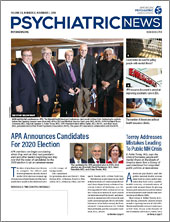Sertraline May Reduce Anxiety Faster Than Depression
A study in The Lancet Psychiatry suggests that sertraline is unlikely to reduce symptoms of depression within six weeks in patients prescribed the medication in primary care settings, but it may improve patients’ anxiety, quality of life, and self-reported improvements in mental health.
In the study, 550 patients aged 18 to 74 who presented with depressive symptoms at a primary care setting were randomized to either sertraline or placebo. Researchers measured the patients’ depression with the nine-item Patient Health Questionnaire and found no significant reduction in scores at six weeks in either the sertraline or placebo groups, and only weak evidence that sertraline reduced depression symptoms at 12 weeks.
The researchers also measured the patients’ anxiety with the seven-item Generalized Anxiety Disorder Assessment (GAD-7) and the patients’ mental and physical health-related quality of life with the 12-item Short-Form Health Survey. At six weeks, scores had improved on the GAD-7 and the mental health portion of the Short-Form Health Survey for those who took sertraline compared with those who took placebo. Patients in the sertraline group were also more likely than those in the placebo group to report feeling better emotionally.
“The Clinical Effectiveness of Sertraline in Primary Care and the Role of Depression Severity and Duration (PANDA): A Pragmatic, Double-Blind, Placebo-Controlled Randomised Trial” is posted
here.
FDA Panel Recommends Approval for OTC Nicotine Mouth Spray
The FDA’s Nonprescription Drugs Advisory Committee in September narrowly voted in favor of approval of GlaxoSmithKline’s OTC nicotine mouth spray to aid smoking cessation in people aged 18 years and older. Although the FDA is not obligated to follow the committee’s recommendations, the agency usually does so. The spray is currently marketed in 45 countries.
Each spray delivers 1 mg of nicotine. Users would take up to four sprays per hour and a maximum of 64 sprays per day when they get the urge to smoke.
The committee’s recommendation was based on the results of eight clinical trials, including two multicenter phase 3 studies. The studies compared smoking abstinence in participants who used the spray with those who received a placebo and showed a statistically significant treatment difference between the two groups from week 2 to week 6. The results were not particularly strong (the number needed to treat was 40, meaning 40 smokers would need to be treated with 1 mg of the spray instead of placebo for one additional smoker in the treatment group to refrain from smoking during those weeks compared with the placebo group. At the end of 26 weeks, only 3.4% of patients in the treatment group had quit smoking, but 79% kept using the product, suggesting participants continued to use cigarettes along with the spray.
The most common side effects of the nicotine mouth spray were hiccups, headache, nausea, throat irritation, indigestion, and dizziness.
FazaClo to Be Discontinued November 30
Jazz Pharmaceuticals Inc. will discontinue all dosage strengths of FazaClo (clozapine orally disintegrating tablets) as of November 30. Branded FazaClo will no longer be available in the United States after the available supply is exhausted. A company spokesperson said that the decision to discontinue is unrelated to the medication’s safety or effectiveness and was made because of “limited utilization of FazaClo given the availability of generic versions of clozapine products, including orally dissolving tablets in the same dosage strengths.”
A company spokesperson also said the company hopes that quick dissemination of the news about the drug’s discontinuation will help facilitate the transition to other treatment options ■
